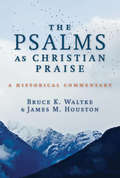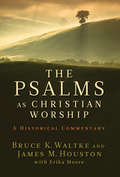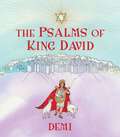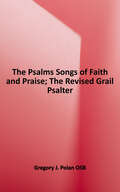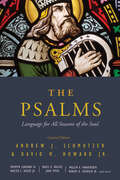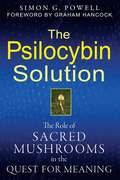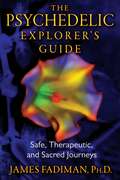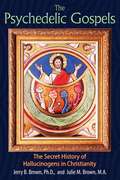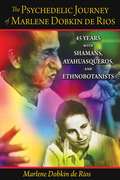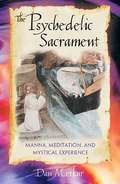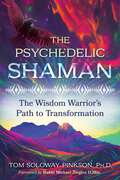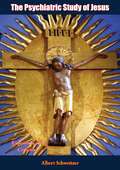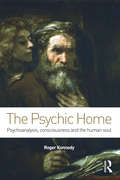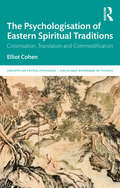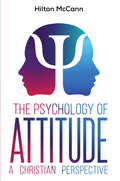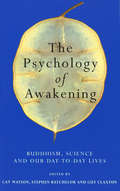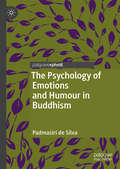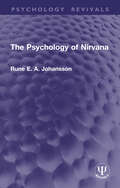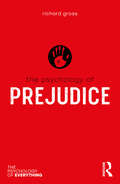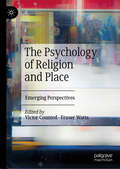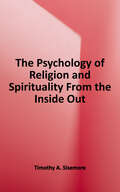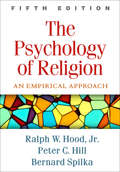- Table View
- List View
The Psalms as Christian Praise: A Historical Commentary
by Bruce K. Waltke James M. HoustonTwo respected scholars explore the heart of the PsalmsFollowing in the style of their companion volumes, The Psalms as Christian Worship and The Psalms as Christian Lament, Bruce Waltke and James Houston now explore the depths of Christian praise. Each volume uniquely blends verse-by-verse commentary with a history of Psalms interpretation in the church from the time of the apostles to the present. Since praise is the essence of the book of Psalms, Waltke and Houston have narrowed the focus to Book IV of the Psalter (Psalms 90-106), which magnify God and proclaim him king. To give voice to the psalmist, the authors (carefully) translate and explain each psalm and summarize its theological message. This is followed by listening to the voice of godly churchmen whose comments have stood the test of time. The Psalms as Christian Praise is ideal for anyone seeking to better understand the praise of Israel as found in the Psalms and how Christians also use these Psalms in worship.
The Psalms as Christian Praise: A Historical Commentary
by Bruce K. Waltke James M. HoustonTwo respected scholars explore the heart of the PsalmsFollowing in the style of their companion volumes, The Psalms as Christian Worship and The Psalms as Christian Lament, Bruce Waltke and James Houston now explore the depths of Christian praise. Each volume uniquely blends verse-by-verse commentary with a history of Psalms interpretation in the church from the time of the apostles to the present. Since praise is the essence of the book of Psalms, Waltke and Houston have narrowed the focus to Book IV of the Psalter (Psalms 90-106), which magnify God and proclaim him king. To give voice to the psalmist, the authors (carefully) translate and explain each psalm and summarize its theological message. This is followed by listening to the voice of godly churchmen whose comments have stood the test of time. The Psalms as Christian Praise is ideal for anyone seeking to better understand the praise of Israel as found in the Psalms and how Christians also use these Psalms in worship.
The Psalms as Christian Worship: An Historical Commentary
by Bruce K. Waltke James M. HoustonThis commentary uniquely combines a verse-by-verse exposition of the Hebrew text of selected Psalms with a history of their interpretation in the Church from the time of the apostles to the present. / Bruce K. Waltke begins the collaboration by first skillfully establishing the meaning of the chosen psalms through careful exegesis in which each text is interpreted in light of its historical backgrounds, its literary form, and the poet’s rhetoric. James M. Houston then exposits each text’s relevance in conjunction with the Church’s interpretation of it throughout her history. To further the accuracy of this interpretation, he commissioned fresh translations of numerous Latin and Middle English texts. / The authors’ purpose in creating this volume was not merely to produce a masterful commentary. Rather, they wished to aid in enriching the daily life of the contemporary Christian and to deepen the church’s community. Waltke and Houston here bring together the two voices of the Holy Spirit — heard infallibly in Scripture and edifyingly in the Church’s response — in a rare and illuminating combination.
The Psalms of King David
by DemiThe Bible tells us that King David was a man after God&’s own heart (1 Samuel 13:14), chosen by Him to lead his people Israel. David began life as a simple shepherd, but his fearless courage and unshakeable faith in God would see him slay the Philistine giant Goliath and become a celebrated warrior. After the death of King Saul, the Lord God would establish David as king over Israel. Soon, he would go on to conquer the fortress city of Jerusalem and install the Ark of the Covenant within its walls. But, above all, King David would be remembered as the inspired poet and harpist who composed the Biblical Psalms to the Lord his God. Award-winning author, Demi, recounts the dramatic story of David, the shepherd who rose to become king.
The Psalms songs of faith and praise: the Revised Grail Psalter with commentary and prayers
by Gregory J. PolanGraceful and inspiring, here is an insightful and moving introduction to the Book of Psalms as prayer.
The Psalms through Three Thousand Years: Prayerbook of a Cloud of Witnesses
by William L. HolladayThis book has three sections; Part One, "The Psalms Take Shape--A Reconstruction" attempts to discern the origin of the Psalms and psalm collections; Part 2, "The Psalter through History" describes the use of the psalms at Qumran (the Dead Sea Scroll community) in the New Testament and in the Jewish and Christian communities down through the ages; Part 3, "Current Theological Issues" explores some of the questions of the use, translation, and interpretation of the Psalms that confront us today.
The Psalms: Language for All Seasons of the Soul
by Andrew J. Schmutzer David M. Howard Jr.The Psalms: Language for All Seasons of the Soul brings together essays from eighteen Old Testament scholars discussing the latest in Psalms scholarship and applying exegetical insights to the life of faith. These essays explore the full range of emotion expressed in the Psalms—from elation to distress—while weaving together observations from biblical scholarship and theology. The reader will gain valuable insights into how the Psalms speak to his or her soul. The book is divided into five sections that:Give an overview of Psalms studies in the 21st centuryDiscuss psalms of praiseExplore psalms of lamentLook at the big picture of the Psalter as a bookPresent sermons on the Psalms that are models of evangelical engagement with the text. A Select Bibliography for Psalms Study is included at the end of the book.
The Psalms: Language for All Seasons of the Soul
by Andrew J. Schmutzer David M. Howard Jr.The Psalms: Language for All Seasons of the Soul brings together essays from eighteen Old Testament scholars discussing the latest in Psalms scholarship and applying exegetical insights to the life of faith. These essays explore the full range of emotion expressed in the Psalms—from elation to distress—while weaving together observations from biblical scholarship and theology. The reader will gain valuable insights into how the Psalms speak to his or her soul. The book is divided into five sections that:Give an overview of Psalms studies in the 21st centuryDiscuss psalms of praiseExplore psalms of lamentLook at the big picture of the Psalter as a bookPresent sermons on the Psalms that are models of evangelical engagement with the text. A Select Bibliography for Psalms Study is included at the end of the book.
The Psilocybin Solution: The Role of Sacred Mushrooms in the Quest for Meaning
by Graham Hancock Simon G. PowellHow psilocybin mushrooms facilitate a direct link to the wisdom of Nature and the meaning of life • Examines the neurochemistry underlying the visionary psilocybin experience • Explains how sacred mushrooms help restore our connection to the natural intelligence of Nature • Reviews the research on psilocybin’s ability to dispel anxiety in the terminally ill and its helpful effects on obsessive-compulsive disorder It has been more than 50 years since sacred mushrooms were plucked from the shamanic backwaters of Mexico and presented to the modern world by R. Gordon Wasson. After sparking the psychedelic era of the 1960s, however, the divine mushroom returned underground from whence it mysteriously originated. Yet today, the mushroom’s extraordinary influence is once again being felt by large numbers of people, due to the discovery of hundreds of wild psilocybin species growing across the globe. In The Psilocybin Solution, Simon G. Powell traces the history of the sacred psilocybin mushroom and discusses the shamanic visionary effects it can induce. Detailing how psilocybin acts as a profound enhancer of consciousness and reviewing the research performed by the Multidisciplinary Association for Psychedelic Studies (MAPS), Johns Hopkins University, and the Heffter Research Institute on psilocybin’s ability to dispel anxiety in the terminally ill and its helpful effects on obsessive-compulsive disorder, he examines the neurochemistry, psychology, and spirituality underlying the visionary psilocybin experience, revealing the interface where physical brain and conscious mind meet. Showing that the existence of life and the functioning of mind are the result of a naturally intelligent, self-organizing Universe, he explains how sacred mushrooms provide a direct link to the wisdom of Nature and the meaning of life.
The Psychedelic Explorer's Guide: Safe, Therapeutic, and Sacred Journeys
by James FadimanPsychedelics for spiritual, therapeutic, and problem-solving use • Presents practices for safe and successful psychedelic voyages, including the benefits of having a guide and how to be a guide • Reviews the value of psychedelics for healing and self-discovery as well as how LSD has facilitated scientific and technical problem-solving • Reveals how microdosing (ultr-low doeses) improve cognitive functioning, emotional balance, and physical stamina • This year 600,000 people in the U.S. alone will try LSD for the the first time, joining the 23 million who have already experimented with this substance Called “America’s wisest and most respected authority on psychedelics and their use,” James Fadiman has been involved with psychedelic research since the 1960s. In this guide to the immediate and long-term effects of psychedelic use for spiritual (high dose), therapeutic (moderate dose), and problem-solving (low dose and microdose) purposes, Fadiman outlines best practices for safe, sacred entheogenic voyages learned through his more than 40 years of experience--from the benefits of having a sensitive guide during a session (and how to be one) to the importance of the setting and pre-session intention. Fadiman reviews the newest as well as the neglected research into the psychotherapeutic value of visionary drug use for increased personal awareness and a host of serious medical conditions, including his recent study of the reasons for and results of psychedelic use among hundreds of students and professionals. He reveals new uses for LSD and other psychedelics, including microdosing, extremely low doses, for improved cognitive functioning and emotional balance. Cautioning that psychedelics are not for everyone, he dispels the myths and misperceptions about psychedelics circulating in textbooks and clinics as well as on the internet. Exploring the life-changing experiences of Ram Dass, Timothy Leary, Aldous Huxley, and Huston Smith as well as Francis Crick and Steve Jobs, Fadiman shows how psychedelics, used wisely, can lead not only to healing but also to scientific breakthroughs and spiritual epiphanies.
The Psychedelic Gospels: The Secret History of Hallucinogens in Christianity
by Jerry B. Brown Julie M. BrownReveals evidence of visionary plants in Christianity and the life of Jesus found in medieval art and biblical scripture--hidden in plain sight for centuries• Follows the authors’ anthropological adventure discovering sacred mushroom images in European and Middle Eastern churches, including Roslyn Chapel and Chartres• Provides color photos showing how R. Gordon Wasson’s psychedelic theory of religion clearly extends to Christianity and reveals why Wasson suppressed this information due to his secret relationship with the Vatican• Examines the Bible and the Gnostic Gospels to show that visionary plants were the catalyst for Jesus’s awakening to his divinity and immortalityThroughout medieval Christianity, religious works of art emerged to illustrate the teachings of the Bible for the largely illiterate population. What, then, is the significance of the psychoactive mushrooms hiding in plain sight in the artwork and icons of many European and Middle-Eastern churches? Does Christianity have a psychedelic history?Providing stunning visual evidence from their anthropological journey throughout Europe and the Middle East, including visits to Roslyn Chapel and Chartres Cathedral, authors Julie and Jerry Brown document the role of visionary plants in Christianity. They retrace the pioneering research of R. Gordon Wasson, the famous “sacred mushroom seeker,” on psychedelics in ancient Greece and India, and among the present-day reindeer herders of Siberia and the Mazatecs of Mexico. Challenging Wasson’s legacy, the authors reveal his secret relationship with the Vatican that led to Wasson’s refusal to pursue his hallucinogen theory into the hallowed halls of Christianity.Examining the Bible and the Gnostic Gospels, the authors provide scriptural support to show that sacred mushrooms were the inspiration for Jesus’ revelation of the Kingdom of Heaven and that he was initiated into these mystical practices in Egypt during the Missing Years. They contend that the Trees of Knowledge and of Immortality in Eden were sacred mushrooms.Uncovering the role played by visionary plants in the origins of Judeo-Christianity, the authors invite us to rethink what we know about the life of Jesus and to consider a controversial theory that challenges us to explore these sacred pathways to the divine.
The Psychedelic Journey of Marlene Dobkin de Rios: 45 Years with Shamans, Ayahuasqueros, and Ethnobotanists
by Marlene Dobkin de RiosA look inside almost half a century of pioneering research in the Amazon and Peru by a noted anthropologist studying hallucinogens, including ayahuasca • Reveals how ayahuasca successfully treats psychological and emotional disorders • Examines adolescent drug use from a cross-cultural perspective • Discusses the deleterious effects of drug tourism in the Amazon Ayahuasca is an alkaloid-rich psychoactive concoction indigenous to South America that has been employed by shamans for millennia as a spirit drug for divinatory and healing purposes. Although the late Harvard ethnobotanist Richard Evans Schultes was credited in the early 1950s as being the first to document the use of ayahuasca, other researchers, such as the distinguished anthropologist Marlene Dobkin de Rios, were responsible for furthering his findings and uncovering the curative capabilities of this amazing compound. The Psychedelic Journey of Marlene Dobkin de Rios presents the accumulated experience of de Rios’s 45 years of pioneering field studies in the area of hallucinogens in Peru and the Amazon. Her investigation into ayahuasca--which she undertook in collaboration with more than a dozen traditional Mestizo folk curanderos, shamans, and fellow ethnobotanists--focuses on the use of this revolutionary plant in the treatment of recalcitrant psychological and emotional disorders. She also shares some of her theories that prove that the ancient Maya used psychedelic plants as part of their religious rituals, thereby demonstrating the impact of plant psychedelics on human prehistory. In addition, Dobkin de Rios examines altered states of consciousness derived from the use of biofeedback and hypnosis and discusses her current work on the deleterious effects of drug tourism in the Amazon.
The Psychedelic Sacrament: Manna, Meditations, and Mystical Experience
by Dan Merkur• Reveals the secret teachings from the Judeo-Christian traditions that promote the use of psychedelic substances to enhance religious transcendence.• Explains how special meditations were designed to be performed while partaking of the "psychedelic sacrament".In The Mystery of Manna, religious historian Dan Merkur provided compelling evidence that the miraculous bread that God fed the Israelites in the wilderness was psychedelic, made from bread containing ergot--the psychoactive fungus containing the same chemicals from which LSD is made. Many religious authorities over the centuries have secretly known the identity and experience of manna and have left a rich record of their involvement with this sacred substance. In The Psychedelic Sacrament, a companion work to The Mystery of Manna, Dan Merkur elucidates a body of Jewish and Christian writings especially devoted to this tradition of visionary mysticism. He discusses the specific teachings of Philo of Alexandria, Rabbi Moses Maimonides, and St. Bernard of Clairvaux that refer to special meditations designed to be performed while partaking of the "psychedelic sacrament." These meditations combine the revelatory power of psychedelics with the rational exercise of the mind, enabling the seeker to achieve a qualitatively enhanced state of religious transcendence. The Psychedelic Sacrament sheds new light on the use of psychedelics in the Western mystery tradition and deepens our understanding of the human desire for divine union.
The Psychedelic Shaman: The Wisdom Warrior's Path to Transformation
by Tom Soloway Pinkson• Explores how to work ethically, skillfully, and responsibly with psychedelics and plant spirits• Shares the author&’s transformative psychedelic experiences and how they helped him discover his life&’s purpose• Provides shamanic practices to develop your capacity as a Wisdom Warrior, heal personal and collective trauma, and connect with infinite cosmic loveTaking us through his more than 50 years of immersion in psychedelic shamanism, Tom Soloway Pinkson shares profound Indigenous teachings, plant teacher wisdom, and his own transformative experiences on the psychedelic Wisdom Warrior path.Pinkson shares his journey of awakening through childhood trauma to a revelatory connection with nature. He describes his mentorship with Indigenous medicine peoples around the world, including an eleven-year initiatory apprenticeship with Guadalupe de la Cruz, a renowned Huichol shaman. Through his experiences with death and dying and with LSD, peyote, and ayahuasca, he forged a cosmology based on the interconnectedness of all beings and dedicated to shifting a fear-based world to a love-based one.Presenting a map for others to follow the Wisdom Warrior path of psychedelic shamanism, the author explores how to work ethically, skillfully, and responsibly with psychedelics and plant spirits. He also shares shamanic practices to develop your capacity to connect with the infinite cosmic love that is the essence of our being as well as shows how to restore the sacred in everyday life and discover your role in helping to heal and transform our world.
The Psychiatric Study of Jesus: Exposition and Criticism
by Albert SchweitzerFor His Doctoral Thesis, Schweitzer Chose To Write On Recent Medical Treatises Which Showed, At Least To The Authors' Satisfaction, That Jesus Was Mentally Diseased. The Book Was Published In German In 1913.“Work of a major prophet....Dr. Schweitzer demolishes the published theories that Jesus was mentally abnormal....His uses of his sources are a delight to follow.”—St. Louis Star-Times“It is a monument to the many-sided genius of one of the truly great men of this century. English-speaking people throughout the world will be grateful for this translation.”—Quarterly Review of Biology“The very brevity of this small volume reflects the genius of Albert Schweitzer....At no point does the author appeal to the authority of revealed religion. He meets naturalists on their own grounds....The smooth translation and Introduction by Charles R. Joy and the instructive Preface by Dr. Winfred Overholser enrich the reader’s comprehension and enjoyment of this classic essay”—Dr. Gordon W. Allport, Harvard University“No one is better qualified to speak of the revolutionary personality of Jesus than Schweitzer.”—Boston Herald“Terse, lucid exposition.”—Washington Star
The Psychic Home: Psychoanalysis, consciousness and the human soul
by Roger KennedyThe Psychic Home: Psychoanalysis of Consciousness and the Human Soul develops, from a number of different viewpoints, the significance of home in our lives. Roger Kennedy puts forward the central role of what he has termed a ‘psychic home’ as a vital psychic structure, which gathers together a number of different human functions. Kennedy questions what we mean by the powerfully evocative notion of the human soul, which has important links to the notion of home and he suggests that what makes us human is that we allow a home for the soul. As an illustration of this concept he explores how it can help to understand a vital element of William Wordsworth’s development as a poet. The word soul is both abstract and yet also powerfully emotive. Kennedy shows that it can be approached from a number of different angles, from psychoanalysis, philosophy, religion, sociology, literature and neuroscience. The Psychic Home, discusses the mysteries and complexities of the soul, and aims to evoke some restoration of its place in our thinking. It illustrates how the word soul and similar key words, such as spirit and inwardness, express so much that is essential for humans, even if we cannot be too precise about their meanings. Insightful, enlightening and broad reaching, The Psychic Home brings the concept of the soul centre stage as an entity that is elemental, an essence, irreducible, and what makes us human as subjects of experience. It will be essential reading for psychoanalysts, psychotherapists, neuroscientists, philosophers and those interested in spirituality and religion.
The Psychologisation of Eastern Spiritual Traditions: Colonisation, Translation and Commodification (Concepts for Critical Psychology)
by Elliot CohenThis essential book critically examines the various ways in which Eastern spiritual traditions have been typically stripped of their spiritual roots, content and context, to be more readily assimilated into secular Western frames of Psychology. Beginning with the colonial histories of Empire, the author draws from the 1960s Counterculture and the subsequent romanticising and idealising of the East. Cohen explores how Hindu, Buddhist and Daoist traditions have been gradually transformed into forms of Psychology, Psychotherapy and Self-Help, undergoing processes of ‘modernisation’ and secularisation until their respective cosmologies had been successfully reinterpreted and reimagined. An important component of this psychologisation is the accompanying commodification of Eastern spiritual practices, including the mass-marketing of mindfulness and meditation as part of the burgeoning well-being industry. Also presenting emerging voices of resistance from within Eastern spiritual traditions, the book ends with a chapter on Transpersonal Psychology, showing a path for how to gradually move away from colonisation and towards collaboration. Engaging with the ‘mindfulness movement’ and other practices assimilated by Western culture, this is fascinating reading for students and academics in psychology, philosophy and religious studies, as well as mindfulness practitioners.
The Psychology of Attitude: A Christian Perspective
by Hilton McCannHave you ever heard someone say ‘I don’t like your attitude!’ or ‘that person has the right attitude’? Maybe these words were said to you? What is meant when ‘attitude’ is referred to in these ways? More fundamentally, what is attitude? Where does it come from and what is its significance? This text addresses these issues and explores the linkage between the diverse stimuli that give rise to attitudes and the action arising (which may be visible or invisible, positive or negative and active or passive). All human beings have attitudes. Attitudes are a significant part of humankind’s framework – not least because they affect behaviour – but attitude is especially significant for Christians. A Christian’s attitude should be the same as that of Christ Jesus (Philippians 2:5) – but what does that mean? The text explores Christ’s attitude and the consequent daily implications. Our tri-partite human framework and the relationship between all those factors emanating from our soul, spirit and body that combine to produce our personal attitudes are examined. Our behaviour to each other is described and contrasted with the way Christ intends us to be. This leads into an examination of Christ’s on-going attitude to humankind. Using the model provided, readers will be able to assess whether they believe they need to change their attitudes to more precisely reflect the Christian way. This text is potentially transformational in helping people examine and refine their attitudes in Christian service.
The Psychology of Awakening: Buddhism, Science and Our Day-to-Day Lives
by Gay Watson, Stephen Batchelor and Guy ClaxtonThe Buddhist view of the mind - how it works, how it goes wrong, how to put it right - is increasingly being recognised as profound and highly practical by scientists, counsellors and other professionals. In The Psychology of Awakening, this powerful vision of human nature, and its implications for personal and social life, are for the first time brought to a wider audience by some of those most influential in exploring its potential for the way we live today. These include: David Brazier Jon Kabat Zinn Francisco Varela Joy Manne Geshe Thubten Jinpa Mark Epstein Gay Watson Maura Sills Guy Claxton Stephen Batchelor Deeply relevant, accessible and authoritative, The Psychology of Awakening will be of interest to all those who wish to understand the workings of their minds a little better and who are also seeking new ways of mastering the challenges - personal, professional and cultural with which modern life confronts us all.
The Psychology of Emotions and Humour in Buddhism
by Padmasiri De SilvaThis book examines the psychological dimensions of emotions and humour in Buddhism. While there is a wealth of material concerning human emotions related to humour and the mindful management of negative emotions, very little has been written on the theory of Buddhist humour. Uniting both Buddhist and Western philosophy, the author draws upon the theory of ‘incongruity humour’, espoused by figures such as Kierkegaard, Kant and Hegel and absorbed into the interpretation of humour by the Buddhist monk and former Western philosopher, Ñāṇavīra Thero. The author makes extensive use of rich primary sources such as the parables used by Ajahn Brahm while interweaving Western theories and philosophies to illuminate this original study of humour and emotion. This pioneering work will be of interest and value to students and scholars of humour, Buddhist traditions and existentialism more widely.
The Psychology of Nirvana (Psychology Revivals)
by Rune E. JohanssonThe oldest Pali writings are of great interest to the psychologist, not only because their analysis of mind is in many ways comparable to his own, but because their teaching has been used for practical purposes with enviable success. One of the most important of the Buddhist concepts is that of Nirvana, or nibbāna, whose modern usage has caused discomfort to many Buddhists, especially those of the Western world. Originally the name for a certain state of mind, and of personality, it has now acquired a multitude of definitions so heterogeneous and contradictory that few people know what to make of it.Originally published in 1969, The Psychology of Nirvana was the first attempt to fit all the diffuse explanations and pronouncements of the oldest scriptures together into a consistent picture, and to relate this picture to modern Western psychology at the time. Just as Nirvana is a psychological state and the natural goal of Buddhism, mental health is the ideal of psychology. A comparative study of the two provides a book truly fascinating to scholars of psychology and Buddhism.
The Psychology of Prejudice (The Psychology of Everything)
by Richard GrossWhy do we develop extreme attitudes to others? Can our personality contribute to our prejudices? How do we reduce prejudice and discrimination? The Psychology of Prejudice explores different forms of prejudice and discrimination, from racial jokes to genocide. It looks at what might cause our prejudiced attitudes, including our personalities, social influences, group identity, and evolutionary factors, and how prejudice can be reduced through education, campaigning, and consciousness raising. Offering insights into a topic of great public concern and debate, The Psychology of Prejudice shows us how we can confront our prejudiced attitudes and contribute to greater tolerance and understanding.
The Psychology of Religion and Place: Emerging Perspectives
by Fraser Watts Victor CountedThis book examines the role of religious and spiritual experiences in people’s understanding of their environment. The contributors consider how understandings and experiences of religious and place connections are motivated by the need to seek and maintain contact with perceptual objects, so as to form meaningful relationship experiences. The volume is one of the first scholarly attempts to discuss the psychological links between place and religious experiences.The chapters within provide insights for understanding how people’s experiences with geographical places and the sacred serve as agencies for meaning-making, pro-social behaviour, and psychological adjustment in everyday life.
The Psychology of Religion and Spirituality: From the Inside Out
by Timothy A. SisemoreThis book provides and introduction to the field of the psychology of religion and spirituality utilizing a mixed method approach allowing persons of faith (and one who is an atheist) to give voice to their experience to supplement the quantitative research that has been done in the field. The text honors the value of religion and spirituality in the lives of the majority of humans while acknowledging the weakness and problems that come with faith as well.
The Psychology of Religion, Fifth Edition: An Empirical Approach (Archive For The Psychology Of Religion/ Archiv Fur Religionspsychologie Ser. #Vol. 27)
by Bernard Spilka Ralph W. Hood Jr. Peter C. HillKeeping up with the rapidly growing research base, the leading graduate-level psychology of religion text is now in a fully updated fifth edition. It takes a balanced, empirically driven approach to understanding the role of religion in individual functioning and social behavior. Integrating research on numerous different faith traditions, the book addresses the quest for meaning; links between religion and biology; religious thought, belief, and behavior across the lifespan; experiential dimensions of religion and spirituality; the social psychology of religious organizations; and connections to coping, adjustment, and mental disorder. Chapter-opening quotations and topical research boxes enhance the readability of this highly instructive text. New to This Edition *New topics: cognitive science of religion; religion and violence; and groups that advocate terrorist tactics. *The latest empirical findings, including hundreds of new references. *Expanded discussion of atheism and varieties of nonbelief. *More research on religions outside the Judeo-Christian tradition, particularly Islam. *State-of-the-art research methods, including techniques for assessing neurological states.
